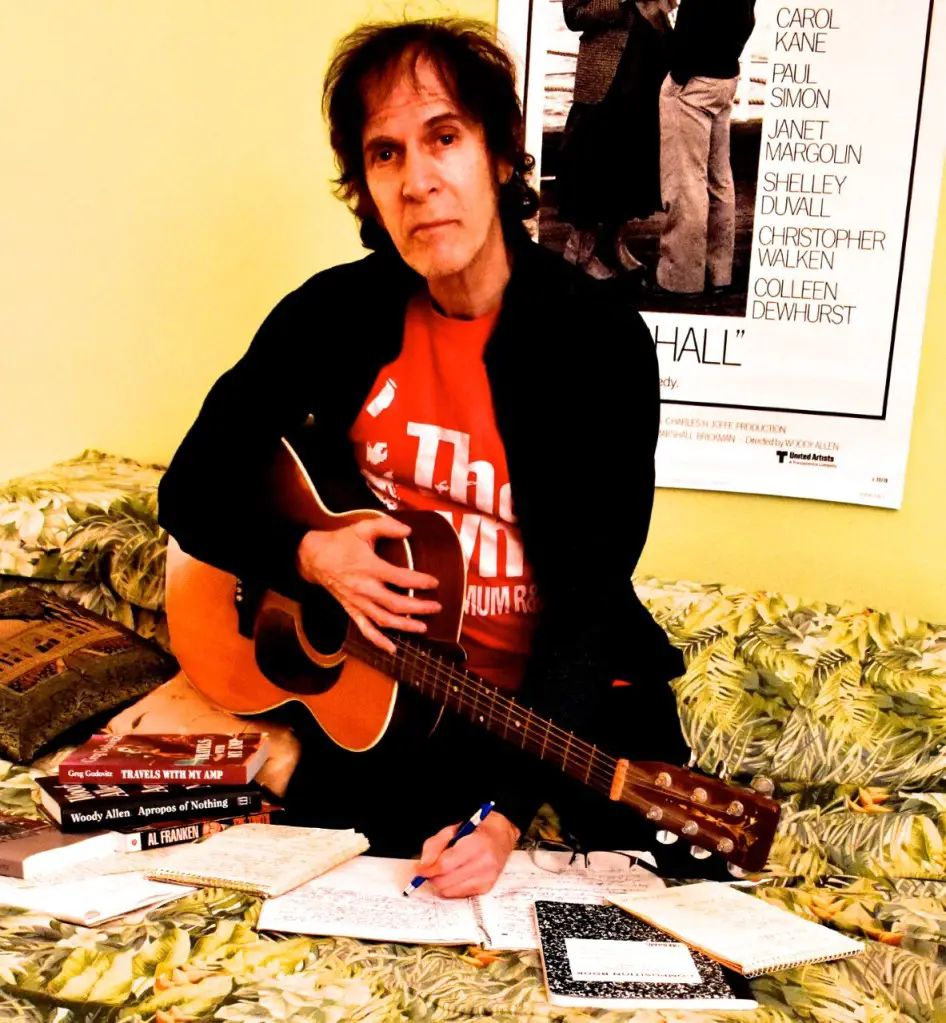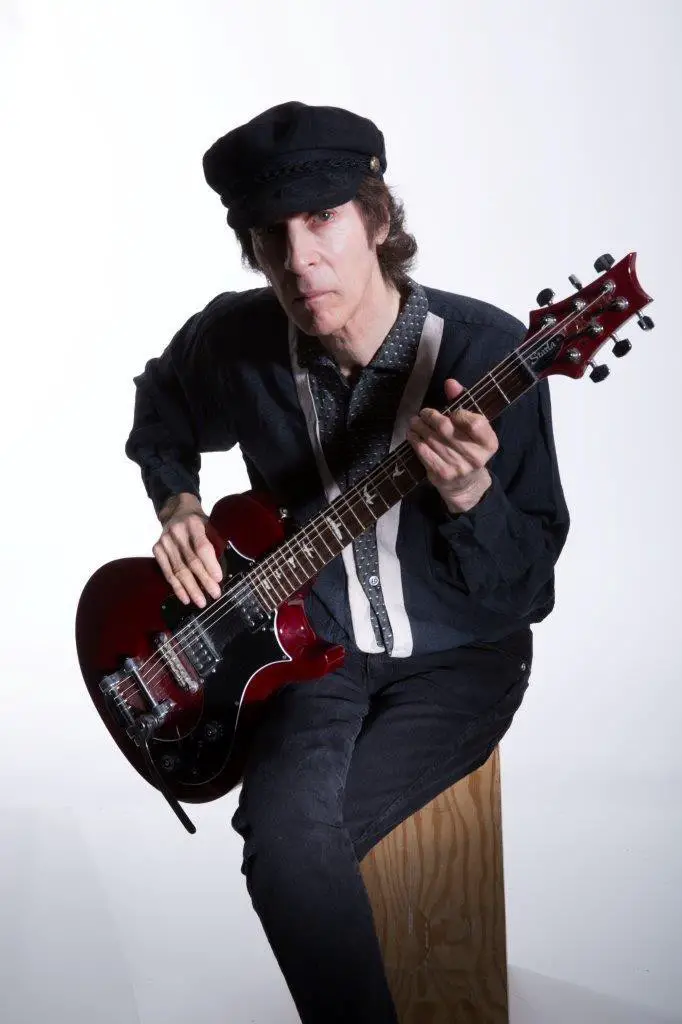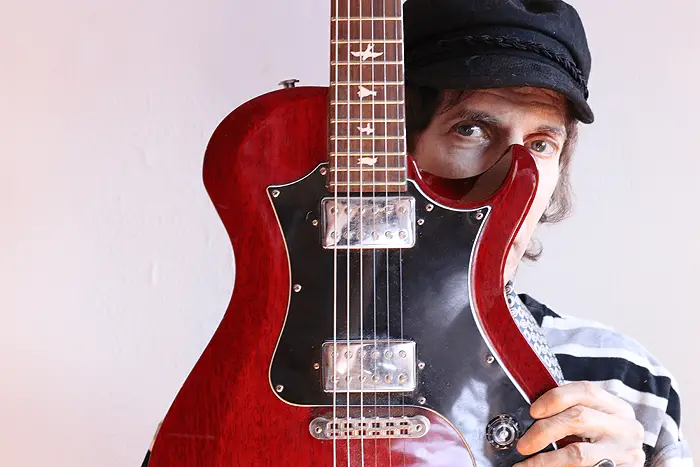All images courtesy of Howlin’ Wuelf Media

Recently, I had the pleasure of speaking with veteran Garage/Indie rocker, Richard X. Heyman. Among other things, we touch on what he’s been up to during the lockdown, his newest music, the history of underrated Garage Rock outfit The Doughboys, and what he’s looking forward to the most once COVID-19 breaks.
If you’re interested in learning more about the work of Richard X. Heyman, you can head over to his website and dig in. Enjoy this interview with Richard. Cheers.
Andrew:
Richard, I appreciate you taking the time today. How have you been holding up over the last year or so? What have you been up to?
Richard:
Thanks for having me! Been holding up pretty well. All in all, I’ve got no complaints. Though I’m sure I could come up with some if I really thought about it. What have I been up to? Let’s see, oh yeah! I recorded and released an album called Copious Notes, with the aid and assistance of my lovely wife Nancy and a few friends playing a variety of instruments. It’s almost more pertinent to ask what I haven’t been up to – like performing live, going to concerts and shows and movies. We really miss seeing and hearing music and ballet at Lincoln Center.
Andrew:
Before we dive into your professional career, let’s go back a bit. What first got you hooked on music?
Richard:
There are two aspects of being attracted to music for me. The first is as a listener. When I heard a song or a piece of music as a kid, it stirred an emotional response. Depending on the song, it could be pure joy or wistfulness, melancholia. So many different reactions. It’s the same now. Chords and melodies, lyrics, arrangements, all elicit strong feelings. The second thing that drew me to music was a desire to try and play it. First, it was the drums. Then the piano and later the guitar. Plus with these instruments, you were able to sing along while you played. Lastly, I always enjoyed wordplay and lyrics. I liked the challenge of writing original songs.
Andrew:
Who were some of your early influences?
Richard:
Gene Krupa played a big part in my desire to be a drummer. I was heavily influenced by the session drummers on the early Rock ‘N’ Roll records – Earl Palmer, Benny Benjamin, Roger Hawkins, Hal Blaine, Bernard Perdie, Gary Chester, Buddy Salzman, Clem Cattini, and Bobby Graham. Then there was Ringo Starr, Charlie Watts, Dino Danelli, Levon Helm, Bobby Elliot, B.J. Wilson, Mitch Mitchell, and Keith Moon. I loved the progenitors of Rock ‘N’ Roll – Elvis, Buddy Holly, Little Richard, Chuck Berry, Eddie Cochran, The Everly Brothers, Bo Diddley, Ray Charles, and James Brown. I’m a big fan of the early 60s era – The Isley Brothers, The Kingsmen, Martha and the Vandellas, Sam Cooke, The Marvelettes, Smokey Robinson & The Miracles, The Temptations, Marvin Gaye, Tammi Terrell, The Supremes, The Four Tops, Stevie Wonder, and Wilson Pickett. Then there’s The Beatles, The Rolling Stones, The Rascals, The Byrds, The Who, The Kinks, The Beach Boys, The Mamas & Papas, Lovin’ Spoonful. I could keep going. I listened to a lot of Broadway show albums and Jazz and Classical. So, there’s a lot of genres swirling and stirring in the pot.

Andrew:
Let’s talk about recent events first. Tell us about your new album, Copious Notes.
Richard:
Copious Notes was written and recorded in 2020. We were in quarantine for part of that time. I didn’t let the circumstances of the pandemic overwhelm me. The songs began as piano instrumentals and we picked out the ones that seemed like they would work with lyrics added to them.
Andrew:
What lyrical themes do you tend to explore with your music? Is your music intensely personal, or are you only telling stories, so to speak?
Richard:
The music usually dictates the direction of the words. There are some themes I tend to gravitate towards – love and lost love, personal relationships, some social commentary, the occasional gazing back. Some songs are personal, like “Cedarbrook Park” and “Oval,” which was a reflection of attending my high school reunion. There are a couple of songs about the divide in society, like “Tell Me When” and “One and All.” The latter is about how insignificant our differences would be if the whole world was engulfed in a cataclysmic event. I thought maybe a global pandemic would suffice. Boy was I wrong! I guess even an attack by extraterrestrials would be politicized in today’s climate.
Andrew:
How about the production side of things? Do you self-produce, or do you bring in outside voices?
Richard:
I produce my albums. Nancy engineers and assists me at every turn. We both need to be satisfied with each step along the way. When we’re done tracking, we have our mixing engineer, Tony Lewis, put it all together. We all contribute ideas and input to achieve the final mix.

Andrew:
I wanted to go back a bit and talk about The Doughboys, which for those that don’t know, are a really great early Garage band. Take us through the formation of the band.
Richard:
Bassist Mike Caruso and I formed the band. We found guitarists Willy Kirchofer and Mike Farina and lead singer Myke Scavone. We tended to go for the rougher Blues-tinged sound. We emulated The Stones, The Kinks, The Animals, and The Yardbirds. We mainly played teenage dances at various venues in New Jersey. Then we got a deal with Bell Records and put out two singles.
Andrew:
Looking back, in my opinion, The Doughboys have been a bit overlooked in terms of bands of that era. In your opinion, what’s the legacy of The Doughboys? How important were they to the US Garage Rock movement?
Richard:
I think we were too young. I was only 14 when we recorded our records. We didn’t have any original songs at the time and were given the songs that became our singles. We did get some airplay on WMCA in New York in exchange for playing the WMCA “Good Guys” shows. These were package concerts on the weekends. Any artist who had a record out at the time, with the exception of the supergroups, did these shows. If one or both of our singles had become hits, then our legacy from that era would be more evident.
Andrew:
The Doughboys initially broke up in 1968. Take me through the end of the band.
Richard:
By ’68 The Doughboys had whittled down to a 3 piece. We were the house band at the Café Wha? in Greenwich Village. It was a very heady experience but it took its toll. The three of us lived together in one room at the Albert Hotel for most of the summer. That close proximity would drive anyone crazy. We just needed to explore some different avenues for making music.
Andrew:
What led to the reformation of The Doughboys in 2000? Where do things stand today? Any new music on the horizon there?
Richard:
I used to tell Nancy stories about The Doughboys (we met long after the band had broken up). So, she thought it would be fun to get the guys back together for a surprise for my birthday. We had such a good time playing that we continued getting gigs. The reunited Doughboys were together for 19 years and released six albums and a live DVD. The group called it a day in 2019. I’m currently recording a bunch of songs I wrote for the band which will be on my next release.

Andrew:
What are a few of your favorite albums and why?
Richard:
By Bob Dylan: The Freewheelin’ Bob Dylan, The Times They Are A’Changin’, Another Side, Bringing It All Back Home, Highway 61, Blonde On Blonde, John Wesley Harding, and Blood On The Tracks. What can you say? So much to dive into, lyrically and musically. A lot of the songs moved me to deep thoughts and sometimes tears.
The Beatles: Pretty much all of them; particular favorites are The Beatles’ Second Album, the British A Hard Day’s Night, Help!, the American Rubber Soul, and Revolver. Melodies, chords, vocals, drumming.
The Kinks: Kink Kontroversy, Face To Face, Something Else, The Kinks Are the Village Green Preservation Society, and Lola vs. Powerman – Ray Davies is probably the finest songwriter to come out of that era.
Jimi Hendrix Experience: Are You Experienced?, and Axis Bold As Love. Those two albums are amazing, not only for Jimi’s guitar prowess but also for Mitch Mitchell’s incredible contributions on drums. Great songs.
The Rolling Stones: England’s Newest Hitmakers, Twelve By Five, December’s Children, Out of Our Heads, Aftermath, and Between The Buttons. Mick and Keith evolved into a great songwriting partnership. Brian Jones’ eclectic musicianship brought a lot to the table. One of the best rhythm sections in the business, Bill Wyman and Charlie Watts. And of course Mick’s whole frontman persona.
The Who: Sing My Generation, and Sell Out – pure adrenalin energy. For my money, the only group worthy of the term “Power Pop.”
The Zombies: Odessey & Oracle – pure Pop beauty.
The Bee Gees: Bee Gees First – incredible writing and vocals.
The Byrds: Mr. Tambourine Man, Turn! Turn! Turn!, Younger Than Yesterday, 5D, and Notorious Byrd Brothers – beautiful harmonies and experimental combinations of genres.
The Band: The Brown Album (which is their second album). When it all comes together – insightful storytelling, passionate singing, and playing.
Joni Mitchell: Ladies of the Canyon, Blue – gorgeous all around.
Procol Harum: Whiter Shade of Pale, Shine On Brightly – majestic soulful music, great drumming by B.J. Wilson.
Sam Cooke: The Man and His Music – finest soul singing you’ll ever hear.
James Brown: Live at the Apollo – the most exciting live album ever.
Original Broadway soundtracks: West Side Story, AND My Fair Lady were influential.
Frank Sinatra: Come Fly With Me, and In the Wee Small Hours – simply the best interpretive singer.
Incredible String Band: 5000 Layers of the Onion – brilliant Folk tunes.
Andrew:
What other passions do you have? How do those passions inform your music, if at all?
Richard:
I have been involved with animal rescue for many years. I also am interested in American history. On the album And Other Stories, I wrote two songs about my love of animals – “Birds” and “No Time To Rest on Sunday.” On my album Hey Man! I have a song called “Civil War Buff” which tells the story of my early near-obsession with the “war between the states,” and another song called “Monica” about a cat I rescued who lived with us for many years.
Andrew:
In your opinion, what is the state of the music business these days? Should artists be hopeful? Scared? Both?
Richard:
I am so out of the loop, I couldn’t even name one top-40 song from the past decade. I’m sure there must be some good music being made but you really have to seek it out. I’m still trying to digest the tried-and-true output from the golden age of Rock ‘N’ Roll (see question #11). As far as the business, I have no interest. I just know it’s impossible to compete with “free.” People can just go on YouTube and listen without purchasing the recording. I’m not sure how you build a business model with that premise. Fortunately for artists, there is the technology to record at home so at least new music can be achieved. The old dream of securing a major label deal is for the most part gone. Most new artists will have to be content with making the best music they can create.
Andrew:
Last one. What’s next on your docket? What are you looking forward to most in the post-COVID world?
Richard:
As I mentioned before, I’m working on my fifteenth album. A lot of the tracks are more rocking and high-energy. Like everyone else, I’m looking forward to the time when this pandemic is under control and we can get back to being in close proximity to our fellow humans.

Interested in learning more about Richard X. Heyman? Check out the link below:
Dig this interview? Check out the full archives of Vinyl Writer Interviews, by Andrew Daly, here: www.vinylwritermusic.com/interview





Leave a Reply